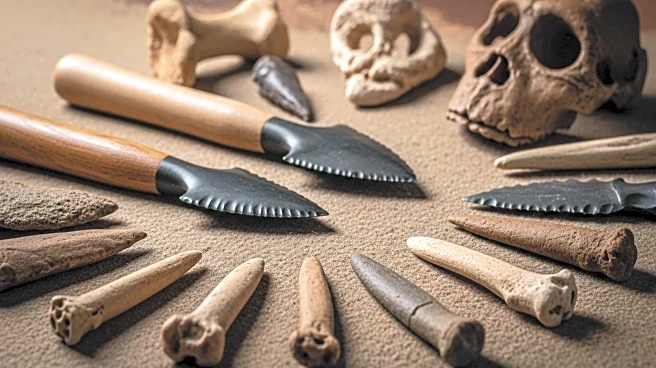What's Happening?
Recent discoveries from European caves have challenged the traditional view of Neanderthals as primarily meat-eaters. Fossil evidence, including dental plaque and ancient feces, indicates that Neanderthals had a varied diet that included cooked crabs, medicinal plants, and legumes. Studies published in Nature and Science reveal regional differences in Neanderthal diets, with some sites showing a meat-heavy intake while others indicate a diet rich in mushrooms, pine nuts, and tree bark. The findings suggest that Neanderthals were adaptable foragers who processed and possibly cooked their food, demonstrating a level of dietary sophistication previously unrecognized.
Why It's Important?
These findings have significant implications for our understanding of Neanderthal behavior and their similarities to modern humans. The evidence of dietary diversity and medicinal plant use suggests that Neanderthals had complex cultural practices and knowledge of their environment. This challenges the stereotype of Neanderthals as primitive and highlights their ability to adapt to different ecological niches. The research also blurs the line between Neanderthals and Homo sapiens, suggesting that Neanderthals were not only hunters but also skilled foragers with a nuanced understanding of their ecosystem.
What's Next?
Further research is likely to explore the extent of Neanderthal dietary practices and their cultural implications. Archaeologists may continue to investigate other sites for similar evidence, potentially uncovering more about Neanderthal social structures and interactions with their environment. The findings could lead to a reevaluation of the evolutionary timeline and the development of human dietary habits.
Beyond the Headlines
The discovery of Neanderthal medicinal plant use opens new avenues for understanding prehistoric pharmacology and its development. The evidence of cannibalism, whether for survival or ritualistic purposes, suggests complex social behaviors that warrant further study. These insights contribute to a broader understanding of human evolution and the cultural practices of early hominins.










